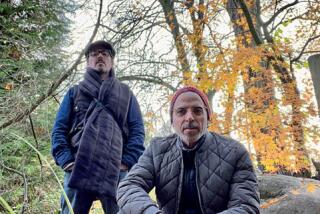MUSIC REVIEWS : HONORING HARRISON
- Share via
Lou Harrison is one of those rare composers with a mind and ears open to all the music around him, in a truly global sense. At the same time, he is not just an eclectically inspired American exotic, but a creator of highly personal stamp as well.
Harrison, who will be 70 on May 14, has been a longtime resident of California. Saturday evening, he attended a celebratory concert of his music at CalArts, which he introduced with brief, pertinent, good-humored remarks.
The bulk of the program was devoted to “La Koro Sutra” (1972), a large, multi-sectional work for chorus and the “American Gamelan” built by Harrison’s friend and colleague, William Colvig. That collection of tubes and drums, trash cans and gas canisters, is a metaphor for Harrison’s music--at once individual, peculiarly American, and remarkably faithful to both the spirit and the sound of the classical Javanese gamelan.
The chorus was assigned largely unison settings of an Esperanto translation of the Buddhist “Heart” sutra. Directed by Jeannine Wagner, the CalArts Chorus--a small, community ensemble--sang Harrison’s arching, melismatic lines with bland, unfocused diligence.
Harrison has been writing recently for Javanese gamelan. CalArts’ “Kyai Kumbul” Gamelan, led by K.R.T. Wasitodinigrat, played his rapt “Gangsaran” Variations and his spry, wry “For the Pleasures of Ovid’s Changes” with buoyant assurance.
The “Fugue for Percussion” (1941), for trash can, musical saw, brake drums, and a coil spring, among other sound sources, was inspired by Henry Cowell’s ideas about rhythmic development. Jeff Brenner, Peter Fagiola, Mark Nauseef and Sharon Schroeder rapped out its permutations earnestly.
More to Read
The biggest entertainment stories
Get our big stories about Hollywood, film, television, music, arts, culture and more right in your inbox as soon as they publish.
You may occasionally receive promotional content from the Los Angeles Times.










